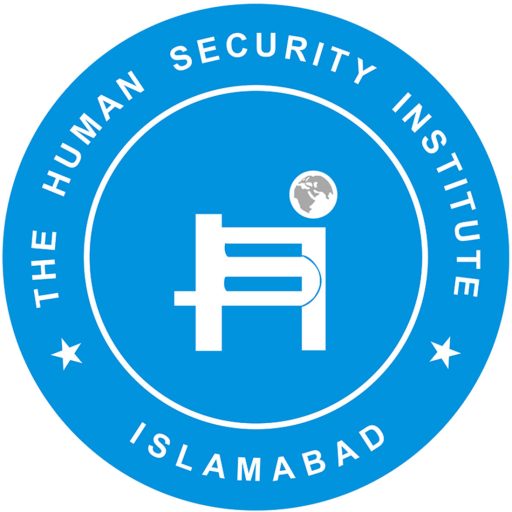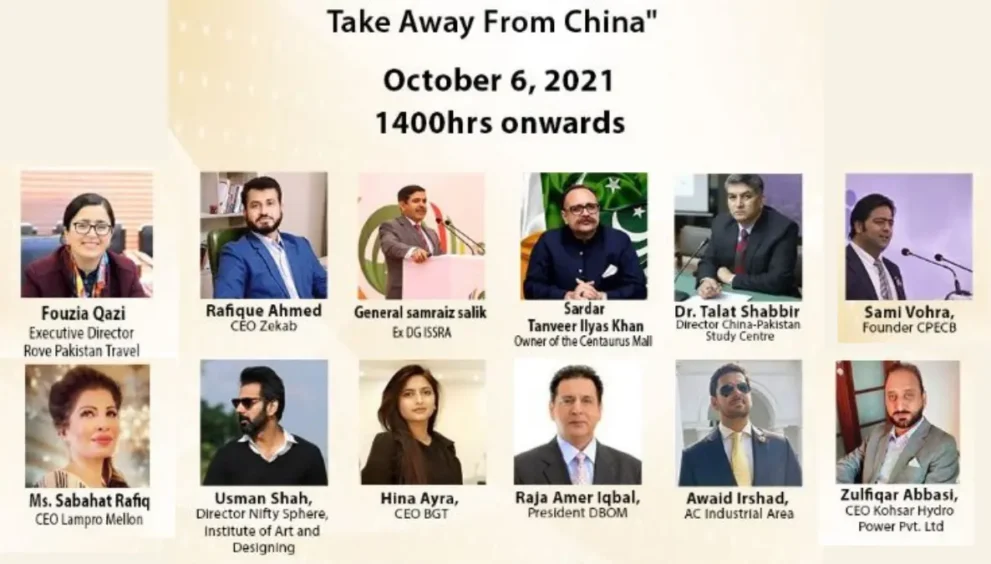October 6, 2021
In collaboration with the Human Security Institute (THIS), China-Pakistan Study Centre (CPSC) at the Institute of Strategic Studies (ISSI) organized an event on “Freedom from Want through Businesses and Entrepreneurship: Take Aways.” The seminar was a star-studded event with representation of leaders from business, entrepreneur, academic, and think tank community including: DG ISSI, Amb. Aizaz Ahmad Chaudhry; Dir, CPSC, Dr. Talat Shabir;, DG THSI, CEO Zekaab, Rafique Ahmad,; Former DG ISSRA, Gen. Samraiz Salik; Hina Ayra, CEO BGT; Raja Amer Iqbal, President DBOM; Zeeshan Ahmed, Director Planning and Strategic Alliance; Fouzia Qazi, Executive Director Rove Pakistan Travel and Tours; Ms. Sbahat Rafiq, CEO Lampro Mellon; Faheem Sardar, Founding and managing Director TANGENT; Sam Ali Dada, President Women Chamber of Commerce and Fashion Designer (SamDada); Naureen Ghaffar, CEO N.G. Marketing; Maj (Rtd) Syed Ali Shazad, Director Grand City; Fouzia Noreen, CEO Creative Horizons and Chairperson of All Pakistan Furniture Exporters Association; Usman Shah, CEO Nifty Sphere Institute of Arts and Designing; Urooj Raza Sayyami, Journalist, Media Entrepreneur Trainer; Nayyar Ali, Special Correspondent, Anchor Person; Dr. Maaz ENT; Sami Ullah Khan Barki,Burki Group of Companies (Pvt) Ltd; Mian Muhammad Ali Moeen, CEO Grand Enclave Hosuing Soceity Gujrat .
Dir. CSP, Dr. Talat Shabir touched upon the subject of human security and explained its critical link to reducing poverty alleviation. He cited China as an exemplary case among the nations that worked wonders for bringing its nations out of pits of poverty. He suggested that think tanks need to provide pragmatic and actionable recommendations for businesses community of both the countries. He was of the view that the Chinese and businesses communities must invest in research and development since knowledge economy is the future.
Earlier in his welcome, DG ISSI, Amb. Aizaz Ahmad Chaudhry highlighted the fact that human security is such a topic that received little or no attention in Pakistan. He said that human security is a strategic issue. After the consideration of geo-economics in our foreign policy overtures, we have a new triad of national security comprising of traditional security issues, non-traditional security threats, and human security. He briefed the audience about the major events of monopoly by the industrialists at national and international level.
In his opening remarks, Former DG ISRAA, Maj Gen. Samraiz Salik ISRA stated that a visible shift of global power from west to east has taken place. He said that concept of security has also changed from state-centric to individual-centric. He said that Pakistan learn a great deal in terms of open door diplomacy from China.
During the discussion session, the speakers and the participants raised many pertinent points. They shared their own experiences with them and proposed result-oriented suggestions. All the speakers and discussants agreed that following the Chinese model blindly would be a huge mistake and Pakistan need to tailor this model according to its needs. They emphasised this fact that Chinese adapted the Socialist ideology according to their own circumstances and needs and described it as Socialism with Chinese Characteristics. The participants noted that Chinese enacted multiple programs and strategies for their rural people and sectors; Pakistan should follow the same. There must be a national program which should be implemented with consistency irrespective of change in national political leadership. Small business must be encouraged at all levels. Business persons voiced their concerns about heavy taxations and FBR polices. They suggested that taxes should be eased and there must be FBR-friendly policies.
In his concluding remarks, Mr. Rafique Ahmed said that consistency and qualified leadership are two notable dispositions that we must learn from Chinese. Beijing and Islamabad have cultural, societal, and religious differences and that must be factored in while following Chinese practices. He also stated that a gender-neutral business environment need to be ensured while, at the same, there is the need to create more opportunities for women.



